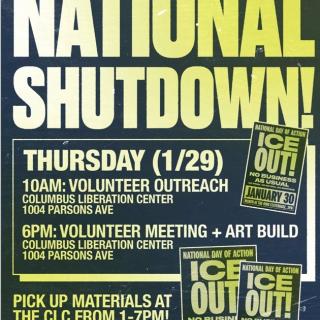Advertisement
The city of Columbus can now tout it's very own bike share program thanks to a $2.3 million contract signed with Alta Bicycle share. If you have been anywhere near downtown in the last month you may have noticed the shiny unmanned stands stocked with bikes and evidently powered by a lone mounted solar panel. When I was approached by my editor about writing an article about riding the CoGo, I was excited about the opportunity to explore the cutting edge of sustainable urban transportation, what I found was a little disappointing.
Here was my experience. First, a little background. I'm a pretty avid cyclist, for a while it was my primary means of transportation and I worked as a bike messenger in Chicago years ago. So I know my way around a city on a bicycle, and while my road bike is a little beat up and the chain is rusty I still ride it to the office when I give myself enough time. So I thought I'd make it a date with my partner Ness and rope my Dad (who just got a bike) into a leisurely ride around downtown. He lives in the King Lincoln area. I'm 33 years old and grew up there when there weren't any hip bars and fancy restaurants on Parsons. So we walked a half mile towards what we thought was the closest station at Columbus State.
Dealing with a vending machine to get something as expensive as a $1,200 bike was a little intimidating. In an attempt to be a good law-abiding citizen, I even tried to read through the legal contract but after four pages of various dos & don'ts, for instance you are not allowed to ride a bike share if you have imbibed alcohol. My eyes glossed over by the time I got to the real legalese and I just clicked OK hoping that I hadn't signed my first-born away to Alta Bicycle share. The real requirement is that you need a valid credit card and, with that, you can rent up to 2 bikes for 24 hours at $6 a bike. This sounds simple and affordable until you realize that you need to dock your bike every 30 minutes or they start charging you $3 per half-hour. This killed our fantasy of throwing the bikes in the back of a pick-up truck and going mountain biking in West Virginia, but I think that's point, they want to keep you and their bike on a short leash.
Once you have given them your credit card and clicked the appropriate buttons, the machine prints out a 5 digit code with variations of 3 that you can use to unlock the bike (before the code self destructs in 5 minutes). After we unlocked the bikes the first thing we noticed was that the bikes are heavy. I had to help Ness yank her bike out because, even when the magnets released them, they are held in by a fair amount of friction.
You can adjust the seat height and that is about it. The 3 speeds on the bike were geared so low that it required high speed peddling to go anywhere. When we started biking we realized that the man we saw riding the bikes the day before, who looked like he was going to fall over, wasn't necessarily doing that because he hadn't ridden a bike in years. Coming from riding a fast, quick road bike, the CoGo bikes felt like I was riding a motorcycle in a Mad Max film that required pedaling. One cool thing was the built-in LED lights that were charged as you rode, but other than that the bikes took a little getting used to and Ness never really felt safe on hers.
Our intention was to pick up my dad and go on a ride with him to the store before stopping to dock the bikes at the Art museum. But by the time we got to his house and picked him up, our 30 minutes were nearly up, so we split off and made a mad dash down Broad St. to try to dock the bikes in time. My bike messenger instincts got the best of me and I tried to make the bike speed me to my destination but I felt like I was crawling. We managed to get to the station with a minute to spare and shoved the bikes in and then headed back to the machine so I could swipe my credit card and get new codes to pull the bikes back out. As we headed back to the east side we passed what looked like the HQ for CoGo, an unmarked warehouse with a CoGo stand on the back of a rental truck. That was where we supposed they dispatched the repair drones from if you happen to hit the red repair button to indicate that you broke the bike during your trip.
By the time we arrived at our rendezvous point, we realize that we were too late and I really started to dislike the constant docking requirement. So we biked over to the main library and were shocked to find the rack where we used to lock our bikes every time we rode there had been replaced with the CoGo station. Regular cyclists now have to lock their bikes up at the opposite side of the plaza. Evidently somebody thought that CoGo was more important than people who own their own bikes.
After leaving the library, interested people started to strike up conversations with us about the bikes. My favorite conversation, with a man named Scott, started out with the bikes, but edged toward local media monopolies and how CoGo and the new police surveillance cameras made him feel like he was living in the dystopian sci-fi movie from the 90s, Demolition Man. Another man asked us how much the bikes cost to rent. I told him $6 and he sounded interested until we explained that you had to dock it every 30 minutes or else it cost you $3 per half hour. He responded with, “I might as well just get my own bike then.” Later, when I was discussing the bike share with another friend, he pointed out a COTA day pass is only $4.50. We ran into another writer for the new Free Press, Ruben Castilla Herrera, who looked at us incredulously and asked “What are you guys doing on these bikes ?” He relayed his experience riding them when he and his friend were excited about the free 24 hour passes they got, only to realize the extreme limits a 30 minute ride policy put on their ability to, say, join friends at a Picnic. We agreed that the program seemed designed to keep bikers within the perimeters of the downtown and to the various tourist attractions that the designers deemed fit. The closest you can get to a residential neighborhood with CoGo is the stations in the Short North & German Village. But if you live in either of those neighborhoods you can probably easily afford your own bike.
At some point we realized we had been talking too long and had to dock our bikes again. We went through the whole ordeal of getting new unlock codes. Our original plan to visit the Audubon center and make more of an adventure of it was derailed by the cumbersome riding experience and the anxiety brought on by feeling that every trip was against the clock. So we headed over to the station on Parson & Oak and docked the bikes. As we walked back, we felt a sense of relief and realized how fun and free it felt to walk. If you do happen to live or work downtown you might be interested to know that you can get a yearly pass for $ 65 but it still doesn't exempt you from the 30 minute limit on rentals. If you haven't ridden a bike for a while and wanted to give the program a try, Yay Bikes! is providing free tours twice a week that you can register for at http://www.howweroll.us through October. More information on the bike share itself is available at http://www.cogobikeshare.com/



